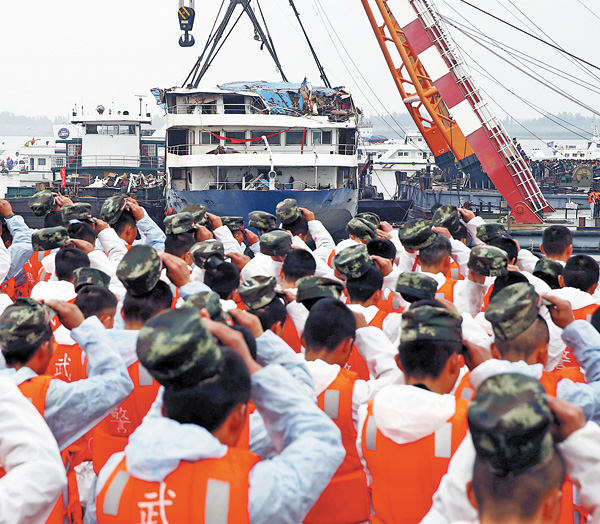Recovery crews face grim task on ship
By Wang Xiaodong (China Daily) Updated: 2015-06-08 06:09
When Chai Maomao found the body of a 3-year-old girl beside a bed in an Eastern Star cabin on Friday night, he was deeply moved.
"It was so sad," the 21-year-old Chai told China Youth Daily. "I pretended she was just asleep."
By Sunday night, 432 passengers and crew members of the Eastern Star had been confirmed dead, and 10 remained missing. Fourteen were rescued alive last week.
The ship overturned with 456 people aboard in extreme weather on the Yangtze River at 9:28 pm on June 1 in Hubei province.
Most of the passengers were retirees, and the 3-year-old girl, whose name has not been released, was the youngest passenger on the ship, China News Service reported.
More than 2,000 rescuers and 200 ships are participating in the search for the missing and recovery of victims' bodies, according to the Ministry of Transport.
The four-story ship was righted and raised out of the water to aid the search for the missing. Previously, more than 200 divers worked around the clock underwater searching for possible survivors in air pockets.
Chai, a soldier from the Guangzhou Military Area Command, joined the search on Thursday and didn't sleep until he finished his shift on Saturday, he said.
Like many of his young colleagues born in the 1990s, this was the first time Chai had participated in a mission to search for bodies after a disaster.
Chai's commander had provided the military team with psychological counseling and guidance on how to treat bodies respectfully during the recovery process.
"Although I was prepared, I was still scared in the beginning," he said. But the fear gradually faded as Chai and his colleagues searched room to room on the ship.
A comrade, Hang Xingwu, developed a technique: "Whenever I feel fear, I imagine the deceased person to be one of my own relatives, and it goes away."
On Saturday, team members found more than 50 bodies in the ship, Chai said. After completing their task, exhaustion set in.
"What I want to do most now is to have a bath and sleep," Chai said.
- Govt encourages people to work 4.5 days a week
- Action to be taken as HIV cases among students rise
- Debate grows over reproductive rights
- Country's first bishop ordained in 3 years
- China builds Tibetan Buddhism academy in Chengdu
- Authorities require reporting of HIV infections at schools
- Typhoon Soudelor kills 14 in East China
- Police crack down on overseas gambling site
- Debate over death penalty for child traffickers goes on
- Beijing to tighten mail security for war anniversary








